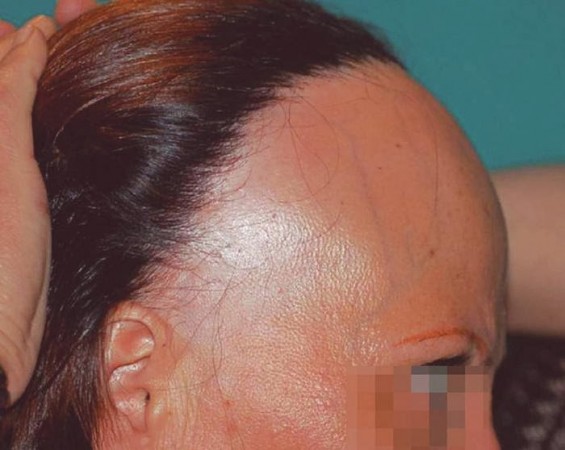
Are you noticing more hair on your pillow or in the shower drain? Is your hairline receding faster than you'd like? These could be early signs of alopecia, a condition that affects millions of people worldwide. Don't fret, though – understanding the warning signs can help you take control of the situation. In this guide, we'll explore the various indicators of alopecia and discuss what steps you can take to address it.
Before we delve into the warning signs, let's have a brief understanding of what alopecia actually is. Alopecia is a broad term for hair loss. It's not just about a receding hairline; it includes different types of hair loss, such as pattern baldness, alopecia areata (patchy hair loss), and more severe forms like alopecia universalis (complete body hair loss).
One of the initial signs of alopecia is gradual hair thinning. You might notice that your hairbrush collects more hair than usual, or your ponytail feels less voluminous. This could be a sign that your hair follicles are becoming more sensitive to hormones that shrink them over time.
Gentlemen, keep an eye on your hairline. If it's slowly moving backward, leaving your forehead more exposed, it could be a sign of male pattern baldness – a common form of alopecia. This usually starts with the temples and crown and can eventually lead to partial or complete baldness on the top of the head.
Alopecia areata appears as distinct round or oval patches of hair loss. It often begins suddenly and can affect any hair-bearing area of the body. These bare patches might be itchy or slightly painful. Although the exact cause is unclear, it's believed to be an autoimmune condition where the body's immune system attacks hair follicles.
Stress, childbirth, surgery, or a significant illness can trigger telogen effluvium. This condition leads to excessive shedding of hair in the resting (telogen) phase. The hair loss might not be immediately noticeable, but over time, you'll realize that your hair has become noticeably thinner.
The emotional impact of alopecia cannot be overlooked. Losing hair, especially for women, can lead to lowered self-esteem and emotional distress. The psychological toll of alopecia is as important as its physical manifestations.
Tight hairstyles like braids, ponytails, and cornrows might look great, but they can lead to traction alopecia. This occurs when the constant pulling of hair puts stress on the hair follicles, causing them to weaken and eventually stop producing hair.
Trichotillomania is a psychological disorder that involves a compulsive urge to pull out one's hair. It often leads to noticeable patches of hair loss. This condition is related to stress and anxiety and might require both psychological and behavioral interventions.
Hormonal fluctuations, such as those during pregnancy, childbirth, or menopause, can trigger temporary hair loss. Understanding that this is a natural part of the body's cycles can provide reassurance.
Alopecia universalis is an uncommon form where hair loss extends to the entire body, including eyebrows and eyelashes. This condition is thought to be an extreme variant of alopecia areata.
Children aren't immune to alopecia. Alopecia areata can affect them too, causing bald spots that might be mistaken for fungal infections or other skin conditions. If your child develops unexplained bald patches, it's important to consult a doctor.
Many people find comfort in using wigs, hairpieces, or scarves to cope with the physical and emotional challenges of alopecia. These accessories offer a chance to express personal style while managing hair loss.
If you notice any unusual hair loss, it's advisable to consult a dermatologist. They can accurately diagnose the type of alopecia you're experiencing and recommend appropriate treatments.
Early intervention is key to managing alopecia effectively. The sooner you address the issue, the better your chances of preserving existing hair and promoting regrowth.
From topical medications and oral treatments to light therapy and hair transplantation, various treatment options exist for different types of alopecia. Consulting a dermatologist will help you determine the best approach for your specific condition.
Alopecia support groups and online communities can provide a safe space to share experiences, tips, and emotional support. Connecting with others who are going through similar journeys can make coping with alopecia less daunting.
Research into alopecia is ongoing, and new treatments are continually being explored. Keeping an eye on emerging advancements in the field can offer hope for the future.
Remember, hair loss doesn't define your worth. Your confidence comes from within. Embrace your journey, and know that you are more than your hair.
Spotting the warning signs of alopecia is the first step toward taking control of your hair health. Stay informed, consult experts, and prioritize self-care.
In conclusion, alopecia is a condition that can impact anyone, regardless of age or gender. By recognizing the warning signs early on and seeking appropriate care, you can navigate this journey with confidence. Remember, you are not alone, and there are resources available to support you every step of the way.
Unveiling the Magic: Ghee and Hot Milk Elixir for Holistic Health
Guarding Your Heart: How Excessive Calcium Could Impact Cardiovascular Well-being